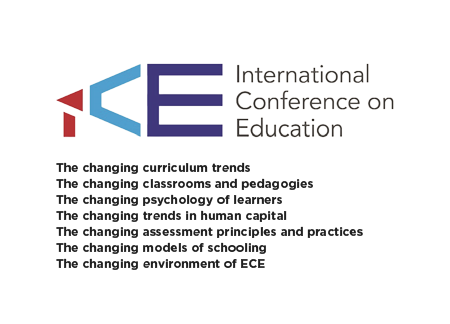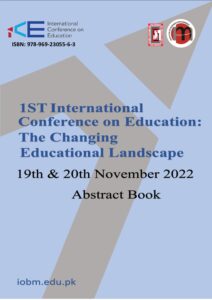Archives
First International Conference on Education
19-20 November (ICE 2022)
The Changing Educational Landscape
Globalization of education has significantly influenced the systems and processes at all levels from preschool to higher education. Like other fields, education is in a constant flux; the purpose, the pedagogies, the content and the methods of assessments are continuously evolving. Parents and students want better quality of education that could facilitate a holistic development of personality, including a creative and critical mindset and a constructivist disposition. A crucial facet of education is to hone skills and knowledge for global citizenship and human capital. Research underscores trends and shifts in educational paradigms which are being practiced in the current global milieu. This evolution in education has a direct impact on the society and the economy of a country. Pakistan being an Islamic democratic state, needs to embrace diversity, modernity and all the 21st century ideas and skills, keeping in view its core values. This conference will help amalgamate the international practices with the national and local context.
The Department of Education invites educationists, academicians, practitioners, teachers, and researchers to put forward their ideas, philosophies and findings at the 1st International Conference on Education (ICE 2022).
Educational administrators, managers and leaders, Academicians and researchers, Teachers, Curriculum developers, Parents
Institute of Business Management (IoBM) is one of the leading higher education institutions in Pakistan which broadens its focus in response to new trends in the rapidly expanding field of education and management. The Department of Education at IoBM offers state of the art degree programs, workshops, seminars, webinars, and conferences for the development of education sector at large. It is one of the most vibrant departments at IoBM, which promotes the vision and mission of the institution by amalgamating research and hands-on learning experiences. The degree programs currently being provided by the Department of Education are B.Ed Honors, MBA Educational Management, MPhil in education and PhD in education.
First International Conference on Education 19-20 November (ICE 2022)
Click here to view
https://photos.app.goo.gl/6CkCw9pgyHnfXLib9
Shaheed Benazir Bhutto University, Shaheed Benazirabad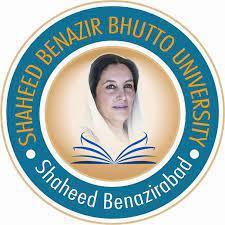 An emerging public sector university in the center of rural Sindh Province, is fully charted University Established through legislative act of the Sindh Assembly [Sindh Act No. XIX of 2010] and is funded by Higher Education Commission, Pakistan. The university aims at promoting quality academic and professional programmes covering all dimension of education. Focus of the university will be the social and basic sciences. At present there is an acute shortage of quality manpower in Pakistan particularly in rural areas. As a result, Education youth from rural areas cannot compete for highly technical and professional jobs, resulting into unemployment and lack of confidence among the rural youth. Therefore the university will also offer market-oriented programmes and develop qualified and motivated professionals through quality education so as to reduce unemployment in the country.
An emerging public sector university in the center of rural Sindh Province, is fully charted University Established through legislative act of the Sindh Assembly [Sindh Act No. XIX of 2010] and is funded by Higher Education Commission, Pakistan. The university aims at promoting quality academic and professional programmes covering all dimension of education. Focus of the university will be the social and basic sciences. At present there is an acute shortage of quality manpower in Pakistan particularly in rural areas. As a result, Education youth from rural areas cannot compete for highly technical and professional jobs, resulting into unemployment and lack of confidence among the rural youth. Therefore the university will also offer market-oriented programmes and develop qualified and motivated professionals through quality education so as to reduce unemployment in the country.
SELD-PPP Node
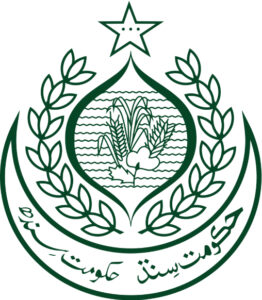
The Sindh Education and Literacy Department was established with the aim of fulfilling the state’s responsibility of providing basic education to its people. The government of Sindh stands committed to universalise education under the Sindh Right of Children to Free and Compulsory Education Act, 2013. Under the Act, the government’s top priority is ‘to provide for free and compulsory education to all children of the age of five to sixteen years.
Education Resource Development Center (ERDC)
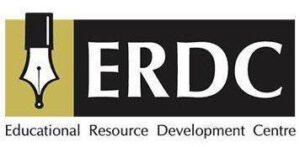
ERDC is a teacher and parent training institute, that envisages social excellence through making teachers, learners, parents and schools realize their meaning and achieve their full potential. Its mission is to contribute to making teaching and learning meaningful through developing effective resources – both human and material. It believes that every teacher, learner, parent and school can become a centre of hope, change and inspiration and contribute to social reform.
The Citizens Foundation (TCF)
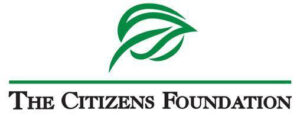
The Citizens Foundation (TCF) is a professionally managed, non-profit organization set up in 1995 by a group of citizens who wanted to bring about positive social change through education. 27 years later, TCF is now one of Pakistan’s leading organizations in the field of education for the less privileged.
Sindh Education Foundation (SEF)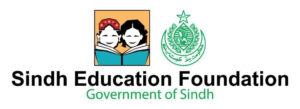 The Sindh Education Foundation (SEF), was established under the Sindh Education Foundation Act, 1992 as a semi-autonomous organization with a mandate to support education in the province through multifarious interventions. The Act provides wide ranging powers to the Foundation to support education sector through a large number of instruments and support activities.
The Sindh Education Foundation (SEF), was established under the Sindh Education Foundation Act, 1992 as a semi-autonomous organization with a mandate to support education in the province through multifarious interventions. The Act provides wide ranging powers to the Foundation to support education sector through a large number of instruments and support activities.
Since its establishment in 1992, the Foundation has made serious efforts to increase access to quality education for the students across Sindh especially those in the remote and under developed regions of the province.
Educationists of Pakistan (EoP)
Educationists of Pakistan (EoP) is a social media platform that connects all educationists. It is a Facebook group with 22k members that provides an exclusive space for teachers, learners trainers and researchers to share educational issues and ways of helping each other and the education community. Its vision is to provide best possible solutions regarding educational issues. Educationists of Pakistan (EoP) is the social media partner for this conference
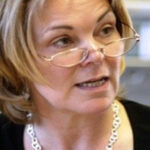 Kathryn Richardson is Professor of Language Education, Head of the Language Centre Department, and Head of the School of Languages, Linguistics and Film (SLLF), one of the eight schools in the Faculty of Humanities & Social Sciences at Queen Mary University of London.
Kathryn Richardson is Professor of Language Education, Head of the Language Centre Department, and Head of the School of Languages, Linguistics and Film (SLLF), one of the eight schools in the Faculty of Humanities & Social Sciences at Queen Mary University of London.
Kathryn steers the SLLF School strategy in terms of education, research and public engagement across its five departments of Modern Languages & Culture, Comparative Literature & Culture, Linguistics, Film and the Language Centre. As Head of the Language Centre, she leads on programmes that prepare overseas and home students to excel in their university degrees as well as leading on programmes which prepare students for employability as global citizens. For both the SLLF School and the Language Centre, Kathryn builds on and enhances the University’s reputation both internationally and in the UK by overseeing the education agenda: programme design & delivery, teacher development & training, student/staff co-creation of curricula. This is to ensure student satisfaction, achievement and intellectual engagement.
The SLLF School offers direct entry to programmes at all levels from pre-undergraduate to doctoral level but also provides students who are denied direct access the opportunity to study for a Foundation Certificate, to gain access to undergraduate degrees, or a Graduate Diploma, to gain access to master’s degrees. In addition, the School also provides University-wide non-specialist language & culture courses in a range of eight global languages to enhance students’ global employability skills.
As a specialist in education, Kathryn serves on a number of Queen Mary committees which aim to improve student engagement, student experience and student success and exerts influence on the education policies and strategies across the University. Kathryn is a Principal Fellow of the Higher Education Academy and a Fellow of the Royal Society of Arts. She holds a Graduate Diploma in Higher Education Management, a Master’s degree in Applied Linguistics for English Language Teaching, a DELTA, CELTA, PGCE and an undergraduate degree in Politics and Sociology.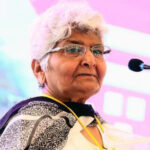 Dr. Arfa Sayeda Zehra is a Pakistani educationist and Urdu language expert. She is Professor of History, with over 50 years of teaching and research experience in various institutions in Pakistan; member of History faculty at FCCU since August 2009; served as visiting faculty member at Lahore University of Management Sciences, National College of Arts, National School of Public Policy, National Institute of Management, Government of Pakistan. Chairperson National Commission on the Status of Women, Member Justice Commission of Pakistan, Member Punjab Public Service Commission and Principal, Lahore College for Women, Lahore. Invited as a speaker on national and international forums including UN and Brooking Institute. Her research interests lie in the areas of Historical Analysis and Critique, Human Rights, Gender Literature and Social issues.
Dr. Arfa Sayeda Zehra is a Pakistani educationist and Urdu language expert. She is Professor of History, with over 50 years of teaching and research experience in various institutions in Pakistan; member of History faculty at FCCU since August 2009; served as visiting faculty member at Lahore University of Management Sciences, National College of Arts, National School of Public Policy, National Institute of Management, Government of Pakistan. Chairperson National Commission on the Status of Women, Member Justice Commission of Pakistan, Member Punjab Public Service Commission and Principal, Lahore College for Women, Lahore. Invited as a speaker on national and international forums including UN and Brooking Institute. Her research interests lie in the areas of Historical Analysis and Critique, Human Rights, Gender Literature and Social issues.
The authors must adhere to the following guidelines for the submission of their work: Please submit your abstract of approximately 250 words via email as an MS-WORD file to education.conferences@iobm.edu.pk. A cover page should indicate the title of the paper, the name(s) of the author(s), their affiliation, and the corresponding author. On acceptance of abstract, a format will be provided for the presentation.
Send your abstracts to: education.conferences@iobm.edu.pk
Deadline: 25th October 2022
All accepted papers with author registration and presentation at the conference will be published in the Proceeding of the conference, subject to the approval of the Conference Committee. Best paper presentations will be recommended for publication in the Journal of Education and Educational Development (JoEED) (ISSN p-2310-0869 & e-2313-3538). JoEED is a double-blind peer-reviewed bi-annual journal designed as an outlet for research in Education and Educational Development. JoEED is HEC Approved “Y” Category Journal.
 1. Title: The changing psychological perspective of teaching
1. Title: The changing psychological perspective of teaching
Speaker: Dr. Arfa Sayeda Zehra
Dr. Arfa Sayeda Zehra is a Pakistani educationist and Urdu language expert. She is Professor of History, with over 50 years of teaching and research experience in various institutions in Pakistan; member of History faculty at FCCU since August 2009; served as visiting faculty member at Lahore University of Management Sciences, National College of Arts, National School of Public Policy, National Institute of Management, Government of Pakistan. Her research interests lie in the areas of Historical Analysis and Critique, Human Rights, Gender Literature and Social issues.
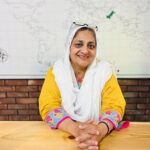 2. Title: The transformation of school education
2. Title: The transformation of school education
Speaker: Ms. Sabina Khatri
Sabina Khatri, the Founder and Chairperson of Kiran Foundation, came to Lyari following a child’s case of abuse and domestic violence. One incident became the starting point of a long journey of Kiran Foundation, a non-profit organization that is challenging norms and paradigms in Lyari since 2004. Over the last decade, Sabina has sacrificed her personal gains and comfort to give hundreds of marginalized children a safe, nurturing environment and to provide them the means to get the quality of life, education and care they deserved, bridging the wide gap that exists between different socioeconomic strata. Her efforts have garnered her several recognitions and awards, Sitara-e Imtiaz (2020) being the most prestigious one. She was selected as one of POND’s Miracle Women in 2016, and received the I AM Karachi PRIDE Award. She was recently also given the Academia Choice Award by the All Sindh Private Schools and Colleges Association. Her work was featured in Ho Yaqeen, a documentary series by Oscar-winner Sharmeen Obaid Chinoy (SOC Films). She also serves as an Executive Board Member at HANDS, a non-profit organization working under the leadership of Dr. Ghaffar Billo. She was also welcomed as a Board Member at Moawin Foundation, working under the leadership of Admira Asif Sandela in the areas of Punjab, Gilgit and Baltistan.
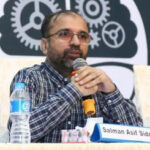 3. Topic: Mentorship Roles in Changing Contexts
3. Topic: Mentorship Roles in Changing Contexts
Speaker: Mr. Salman Asif Siddiqui
Salman Asif Siddiqui is the founder and director of Educational Resource Development Centre (ERDC) – an institute of training and material development in Pakistan. Salman has received his education in Pakistan and specialized in Educational Psychology. He has travelled widely and studied the strengths and limitations of some of the best education systems of the world. His academic pursuits spread across psychology, education, sociology, religion, philosophy, literature, and science. During his extensive experience of over 27 years in the field of education, he has served the roles of a teacher, trainer, counselor, author and editor. One of his many academic contributions is the Charter of Children’s Recognition which has been proposed to ensure insult-free education for every child.
Session Moderator:
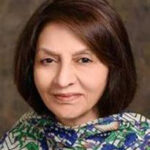
Dr. Zehra Habib
She has a Ph.D. in Education from George Mason University, USA, where she received a dissertation fellowship award in 2011 for conducting research in Pakistan regarding underprivileged women’s participation in peace in the country. She also holds a Master’s in TESOL from American University, USA. Besides, she has a Master’s in English Literature from the University of Karachi, Pakistan. She has three decades of teaching experience and is the recipient of an academic excellence award in 2003 from the Governor of Sindh. Her focus is specifically on gender, relating to the prevention of violence against women. Of specific interest to her are women, peace and security issues, and women’s contribution to peace, both in the Pakistani and international contexts.
Panel Members:

Dr. Kathryn Richardson
She is Professor of Language Education, Head of the Language Centre Department, and Head of the School of Languages, Linguistics and Film (SLLF), one of the eight schools in the Faculty of Humanities & Social Sciences at Queen Mary University of London. As a specialist in education, Kathryn serves on a number of Queen Mary committees which aim to improve student engagement, student experience and student success and exerts influence on the education policies and strategies across the University.
 Dr. Arfa Sayeda Zehra
Dr. Arfa Sayeda Zehra
She is a Pakistani educationist and Urdu language expert. She is Professor of History, with over 50 years of teaching and research experience in various institutions in Pakistan; member of History faculty at FCCU since August 2009; served as visiting faculty member at Lahore University of Management Sciences, National College of Arts, National School of Public Policy, National Institute of Management, Government of Pakistan. Her research interests lie in the areas of Historical Analysis and Critique, Human Rights, Gender Literature and Social issues.
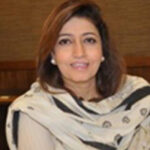 Dr. Huma Baqai
Dr. Huma Baqai
Prof. Dr. Huma Baqai is the Rector of Millennium Institute of Technology and Entrepreneurship, Karachi. She has previously served as an Associate Professor of Social Sciences & Liberal Arts, and was also former Associate Dean, Faculty of Business Administration, at IBA Karachi. She has been working with both national and international media as an international relations expert and political analyst since 1999.
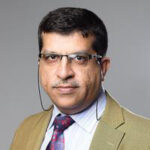 Dr. Tariq Rahim Soomro
Dr. Tariq Rahim Soomro
He is a Professor of Computer Science, Dean at College of Computer Science & Information Systems, and Acting Rector at Institute of Business Management. He has served as Coordinator, Head of Department, Head of Faculty, Dean of Faculty, Head of Academic Affairs, Acting Rector and having wide experience in accreditation related matters, including ABET, HEC Pakistan and Ministry of Higher Education and Scientific Research, United Arab Emirates (UAE). His Research focus on GIS, IDNs, Distance Education, E-Commerce, Multimedia, UNICODE, WAP, P2P, Bioinformatics, ITIL, Cloud Computing, Green Computing, Big Data, IoT, Cybersecurity, Quality of Software, Telemedicine, VoIP, Databases, Programming and Higher Education. He has published over 100 peer-reviewed papers.
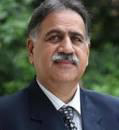 Dr. Amanat Ali Jalbani
Dr. Amanat Ali Jalbani
Prof Dr Jalbani is currently working as a Vice Chancellor at Shaheed Benazir Bhutto University, Benazir Abad/Nawabshah. He has been the Advisor (Academic and Research) to the President as well as the Director of ORIC & OGS at IoBM, Krachi. His career spans over more than 30 years of experience related to higher education leadership and management, tertiary level teaching and research, publishing diverse research work at national and international level, academic administration and business consultation in both public and private domains. Previously, worked as a Faculty Member at ITU CA, San-Jose, CA (w.e.f 2014), Dean Management Sciences, and Vice President Academics, at SZABIST Karachi, Sindh w.e.f 2002 to 2014.
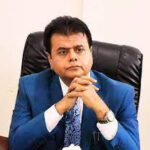 Mr. Ghulam Akbar Laghari
Mr. Ghulam Akbar Laghari
He is a Secretary Education & Literacy Department, government of Sindh Pakistan. He has authored many books about history of Sindhi literature and criticism. His books Sindhi Adabi Jo Mukhtasir Jaezo, Falsafey Ji Mukhtasir Tareekh, it’s Urdu version Falsafey Ki Mukhtasir Tareekh and Adabi Tanqeed ki Tareekh can be counted as his main literary contribution. He serves as chairperson of Sindhi Language Authority, Hyderabad as well as secretary of Culture, Tourism and Antiquity department of Sindh.
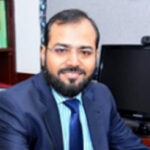 Dr. Sajid Ali
Dr. Sajid Ali
He is the Director, Research and Publications; and Associate Professor at AKUIED. The thematic focus of Dr Sajid’s research revolves around the issues of education policy, governance and leadership. He is keenly interested in leadership processes; policy development and implementation processes; and changing forms of educational governance involving multiple stakeholders. He pursues a mixed-methods strand of educational research and has carried out several qualitative research studies, surveys and evaluations.
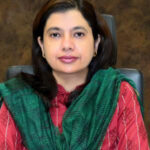 Ms. Sadaf Anees Shaikh
Ms. Sadaf Anees Shaikh
She is a career civil servant from Pakistan Administrative Services having more than 20 years of experience in public administration, public finance & budgeting, and development sector including education. She has also worked on poverty reduction programs and was amongst the pioneering team who launched the Education Management Organizations model evolved under the Sindh Basic Education Program of the USAID under the Public-Private Partnership law of the Government of Sindh. Ms. Sadaf Anees Sheikh also possesses a rich experience of working with the Federal Board of Revenue, Pakistan and has served in different provinces of the country.
Presently, she is working as the Deputy Managing Director (Operations) at Sindh Education Foundation and handles the largest portfolio of Public-Private Partnership schools in Sindh having more than 840,000 enrollments through around 1200 partners operating some 2700 schools / centers in Sindh. She has also been overseeing the portfolio of Training and Assessment and Advocacy and Communications at SEF. Under her auspices, the Training Unit has organized training programs for more than 5000 teachers and school administrators in the last year alone, while the Assessment Unit has conducted assessment of around 120,000 students in the past year.
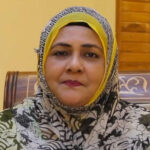 1. Title: Using Story Writing for Integrated Learning
1. Title: Using Story Writing for Integrated Learning
Facilitator: Ms. Fozia Ehsaan Farooqui
Fozia Ahsan Farooqui has a Master’s degree from Karachi University and a certificate in ‘Education’ from Ilkley Community College, Bradford, UK. She has been associated with teaching for over 2 decades. Fozia is an author of more than 40 books. Her Urdu ka Guldasta Series, Urdu Reader, Urdu Khushkhati silsila and Phonic based Urdu quaday are being taught all over Pakistan and outside Pakistan as well. She has held a number of interesting and interactive workshops and webinars at both international and domestic levels. She has also developed teaching guides along with other helpful teaching resource materials to assist urdu teachers. She reaches out to educators and imparts modern and effective teaching methodologies that add value to Urdu Language teaching.
 2. Title: Teaching and Assessing Creative Writing
2. Title: Teaching and Assessing Creative Writing
Facilitator: Dr. Kathryn Richardson
Kathryn Richardson is Professor of Language Education, Head of the Language Centre Department, and Head of the School of Languages, Linguistics and Film (SLLF), one of the eight schools in the Faculty of Humanities & Social Sciences at Queen Mary University of London. As a specialist in education, Kathryn serves on a number of Queen Mary committees which aim to improve student engagement, student experience and student success and exerts influence on the education policies and strategies across the University.
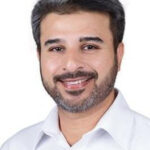 3. Low-cost and No-cost Material
3. Low-cost and No-cost Material
Facilitator: Mr. Ali Usman
Ali Usman is an educationist. He has been working in the field of Education for last 16 years. He has started his career from classroom teaching. He has rich experience of developing teaching resource material. He commenced his career with the Aga Khan Education Service Pakistan (AKES,P) as “Program Associate Arts and Aesthetics.” Moreover, he has also worked with “Swedish Committee for Afghanistan” as a Consultant for the development of Teaching Resource Kit for Afghanistan schools. Beside this he has conducted several workshops on resource development with TRC, AMMAN foundation, AFAQ and Happy home school. Currently, he has been working in Sindh Education Foundation (SEF) as Deputy Director Training and development. In connection with the above two core intervention areas he has developed and conducted several training programs.” ACT” art of classroom teaching is one of the successful examples of a program developed specifically for the improvement of the quality of classroom teaching.

